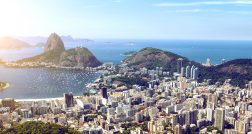All Eyes on South Korea Tourism in 2018
Three specialists weigh in on what will attract travelers this year.
Between the February sporting events in Pyeongchang and tension with North Korea, South Korea tourism could increase or decrease in 2018. We spoke with three hospitality and tourism specialists about what resorts can expect in the months ahead.
Se Hyun Jung
Manager at JSPND Group
“I think the winter sporting event in 2018 is a great opportunity and will cause tourism in South Korea to grow,” says Jung. He acknowledges, however, that North Korea could be a concern for foreign tourists. “It is difficult to reassure U.S. travelers who have these concerns; but one thing I can say is South Korea is not a war country,” he says. “South Koreans don’t worry about North Korea’s nuclear power and believe no attack will occur.”
Garam Hwang
Assistant manager at H.T.C.
“I expect that this year will be better than 2017, not only because of the changing political environment but also because of the international sporting events in February,” Hwang says.
In preparation for this year’s sporting events, South Korea invested in infrastructure. Train lines and stations have been built between Seoul and Pyeongchang, and new properties have opened in the Pyeongchang and Gangwon areas. Hwang expects that the improved infrastructure will actually decrease the number of tourists who stay in Pyeongchang. “The development of transportation infrastructure has shortened the distance between Seoul and Pyeongchang,” Hwang says. “For that reason, I don’t think Pyeongchang will have a large number of tourists. Instead, tourism will be more evenly distributed to other regions.”
Mia Sung
Vacation and customer relations consultant for RCI
Even with hostilities softening between the two countries, some think ongoing concerns about North Korea could suppress inbound travel, although many observers don’t think so. “As long as other countries continue to keep watch and have advisory talks with North Korea, there shouldn’t be any major impacts to inbound travel to South Korea in 2018,” Sung says. She suggests resorts reassure U.S. travelers by keeping them abreast of North Korea–South Korea relations and letting them know that if they need to cancel their plans because of a government advisory, the vacation provider can work with the resorts to rebook or refund fees to travelers.
Sung predicts an overall increase in tourism to South Korea this year, especially since the country is allowing visa-free entrance to Filipinos, Vietnamese and Indonesians as well as temporarily waiving visa fees for Chinese travelers.
To prepare for an influx of travelers, resorts beyond the Pyeongchang area should consider adding to staff and operations teams. Resorts can also offer winter activities such as ice sculpting or ice fishing to attract guests. “These incentives coupled with winter sporting events will translate to an increase in tourism numbers for 2018 and beyond,” Sung says.
Image credit: iStockphoto




